Source: http://www.whatismyipaddress.com/
use seo seo tools seo tool land seo leaders online traffic mystic
Source: http://www.whatismyipaddress.com/
use seo seo tools seo tool land seo leaders online traffic mystic

In that past, we?ve talked a lot about Google?s brand bias, but no matter how a brand is defined in technical terms, the reality is that Google cannot leave popular brand sites out of the search results.
If a person searches for, say, AVIS, and doesn?t see AVIS in the top spot, then as far as the searcher is concerned, Google is broken. If a person searches for various car rental terms and does not see AVIS somewhere, then it's also likely they'll expect Google is broken.
Google isn?t perceived as broken, however, if car-rental-cars-online.com is nowhere to be seen. Some might argue Google is doing the searcher a favour by ignoring such a site.
There was a time on the web when relevant information was harder to come by. Not so now. Now, we have too much information. We don?t even know how big the internet is. They're guessing two trillion pages. And counting.
So, the real competition is clutter.
The real opportunity is to find clear space amongst the throng.
One way to do that is by developing a clear brand identity.
A logo? A set of graphics? A catchy name?
Not really.
Plenty of companies have logos, graphics and a catchy name but they do not have strong brand identities. A brand is largely about how other people define you. They define you based on the experience they have when engaging with you.
For example, take Apple. How would you define their brand? The logo? The shops? The fonts they use in their advertising?
These aspects are not Apple?s brand. Apple?s brand is in the way Apple?s customers feel about Apple. It?s a feeling tied up with concepts such fashion, design, innovation and quality - and unique to Apple.
This feeling creates a clear identity in the mind of the customer.
Having a clear identity makes you memorable. People will remember your site name. People will search for your site name. And when enough people do that, then there is little chance Google can ever drop you below number #1 for brand searches. If you get it right, Google will even rank you against relevant related keywords you aren't targeting.
Because Google would look broken if it didn't feature you.
Tooting our own horn here, but if you typed ?seo book? into Google, and didn?t see this site, you?d think Google was broken. There are plenty of books on SEO, but only one ?seo book? that owns a clear brand identity in this space. And SEO Book gets plenty of traffic from other search search related terms that it does not target, because Google associates the site so strongly with the "SEO education" niche. The people who search on SEO queries click on this site, and once they arrive, they don?t click back too often.

Any company, no matter how small, can develop unique brands and build their own brand related search stream, and associated searches, over time.
If you run a small company, do you occupy clear space? By clear space, think focused, unique selling proposition. What is the thing you offer that others do not? If other people offer what you do, then what is the thing you do better? How do people describe you? Can they reduce it to an elevator pitch? Is what you offer focused, or confused?
It?s about more than providing something a bit unique. In a cluttered environment, like the web, it's about creating something genuinely different. Probably radically different, given the high level of noise in the search results.
Once you have your differentiation down you can then advertise it, which creates further brand awareness: "High dwell campaigns are three times more efficient at stimulating branded search."
This makes for a more defensible search marketing strategy, because it's difficult for generic competition to emulate you once you've carved out a clear identity. It?s not about offering more features. Or a lower price. Those things are details. It?s about crafting a unique identity that others will know you by. Focus on the parts of your business that really make the money, and considering orienting your entire identity around that one aspect.
The problem with not having a clear identity and point of difference, when it comes to SEO, is that it is a constant battle to maintain position. Google can easily flush all the me-too sites that chase generic keywords and Google?s users aren?t going to complain. The sites with unique identities don?t have to spend near as much time, energy and money maintaining rank.
But hang on, doesn?t this go against everything SEO is about?
There?s nothing wrong with chasing generic terms. It?s a completely valid strategy. However, if we?re in it for the long haul, we should also make an effort to develop a clear, differentiated brand. It means we can own our space in the search results, no matter how Google changes in future.
Look at Trip Advisor. Google may be gunning for the travel space with their own content acquisitions, but they?re going to look deficient if they don?t display TripAdvisor. They are going to look deficient if they don't show Trip Advisor when people are looking for just about any travel review queries, whether Trip Advisor is targeting them or not, because Trip Advisor are synonymous with travel reviews. By not featuring Trip Advisor, Google would merely encourage more people to by-pass Google and search Trip Advisor directly.
That's a powerful place to be.
Not everyone can dominate the travel space like Trip Advisor, of course. But it is worth noting that Trip Advisor started small & the principle is the same, no matter what the niche. It?s about becoming the most memorable site in your niche. No matter if it?s poggo sticks for one legged dogs, then be the go-to site for poggo sticks for one legged dogs. Eventually, word gets around, and such a site become synonymous with poggo sticks for one legged dogs, and associated terms, whether they optimize for related terms, or not.
Google will associate keywords with this site in order to deliver a relevant result, and if this site owns the ?poggo sticks for one legged dogs? niche, then their SEO workload is greatly reduced.

Your brand should be something people will talk about. Where are all the links coming from these days? Social networks. Google pays attention to social signals - tweets, Facebook, Google+ and other social links - because that is the way many links occur. They are markers of attention, and Google will always look for markers of attention.
And as their audiences click through to you, Google gets valuable signals about your relevance to entire groups of people. You can be sure Google is grouping these people by interest - creating demographic profiles - and if your site interests a certain group, then this will flow through into searches made by these groups. Google can also tie many of these users back to their identities by using persistent cookies & Google+.
That's the way it's going. SEO, and wider marketing and brand strategy, will all meld together.
Source: http://www.seobench.com/google-yahoo-graph/
use seo seo tools seo tool land seo leaders online traffic mystic
The best part about a growing and very quickly changing industry is the diversity of viewpoints; the worst part is the exact same thing because sometimes 1 always equals 1 and doesn't need bullshit in lieu of evidence. I try my best to stay out of the limelight and just focus on making things happen. However, occasionally a topic will bother me so much that I have to chime in. The last time was over 5 years ago so I figure I'm due to speak up again. Today's topic? Negative SEO. My issue with the topic? Deniers.
There've been several posts on how negative SEO doesn't exist (those are the worst) or that maybe it exists but only weak sites can get hit (in other words, people with opinions that didn't do any testing). I'd like to put those topics to rest as best as a guy that keeps to himself can. I really should be able to do this in one sentence, but in the event what I write as the second half of this sentence doesn't do it for you, I have a couple stories; if crappy SEO of over-optimized anchors and junky links are to blame for ranking drops, how can it be said one cannot do this to someone else, and even if you were to deny this, then why the sudden rush to denounce certain links? On to some anecdotes!
While leading a training session overseas I mentioned a site I watched get hit by some negative SEO activities. I know that it was negative SEO and not a slip up on the SEOs' part by virtue of knowing the history/team behind the site and watching it as part of my normal data routine; the site was managed by the kind of guys that get asked to speak at SEOktoberfest...the kind of people I'd go work for if my bag of tricks ever ran out. Ok, so you're asking how I know it was negative SEO. The easiest explanation is that I watched the site spike heavily with on-theme anchors from junk sites over a one week period and was filtered shortly thereafter. It stayed filtered for just under few months, but 2 days after discussing the site and explaining how I knew the site was hit it magically reappeared (yes, there were googlers in the audience).
If you are skeptical then your first response better be that I'm only loosely describing one example so let me say that in the same industry where I've shared my knowledge of the subject on some more sophisticated methods (first released in the SEObook community), I feel almost like an information arms dealer since even the larger brands have themselves or through affiliated relationships been clubbing each other over the head. You read that right; I explained how I thought negative SEO could be employed and then watched a bunch of people actually do it, repeatedly. Unfortunately, I was hit too, but that's a different issue. In this particular industry, the only people left standing now are some poorly matched local results with fake reviews, a bunch of hacked domains, and the flotsam of macroparasites that gained popularity post Penguin. The only one that came back? The one I publically shared at a conference, explaining exactly how they were a victim based on the link patterns that didn't fit with the site's history over a several year period.
I'll wrap this up with a bit of humor. As a joke a friend of mine asked me to negative SEO him for his name. Let's say his name is John Doe and his domain is johndoe.com. The negative effect was temporary, but I was able to get him filtered for a little while on his name for maybe 120 seconds of my time and less than $50. The site did come back after a few days, but our mutual feeling on the matter is that for an extra $50 double-dose I could probably get the site filtered again. Neither of us wants negative SEO to get any more prevalent than it already is, so I'll skip the details on exactly how it was performed. There are multiple forms of negative SEO significantly scarier than someone with a copy of xrumer and in some cases there is very little you can do to prevent it; if a jerk wants to take you down, it can happen. If your niches begin to look like the wasteland I described above where I shared my thoughts a little too freely, then heaven help you because it doesn't look like Google is going to.
Cygnus has been involved in search since 1997 and loves tackling new and interesting (and of course lucrative) projects. Follow @Cygnus on Twitter for his rants.
Source: http://www.seobook.com/stop-questioning-negative-seo
link building use seo seo tools seo tool land seo leaders online
Source: http://www.useseo.com/viewmember.php?p=33
use seo seo tools seo tool land seo leaders online traffic mystic

Local SEO has the undeserved reputation of being "easy" and "not a lot of work". The competitiveness of keywords might be less competitive than broader keywords but there still is a fair amount of work that goes into getting the campaign off and running properly.
On the whole, keywords targeted in local SEO campaigns are less competitive than their broader counterparts but there are also mitigating factors to consider when determining the overall difficulty of the campaign.
Consideration also needs to be given to how the following factors will effect the overall difficulty of producing a successful campaign:
Some of what I mentioned above doesn't really fall into the "difficulty" of ranking for keywords, but ranking is only a piece of the overall puzzle. You should have an idea of how difficult the entire process will be, because it's more than just rankings at this stage (and has been for awhile).
There are a number of pre-campaign, post-campaign, during-campaign tools you can use for these kinds of campaigns but you don't have to go nuts. Local search stats can be small enough to make extrapolation without PPC or historical analytics data fruitless with respect to actionable date
When you begin to layout your campaign process you could follow a broader roadmap and adjust as necessary. For example, your specifics might change if you are working with an existing site rather than a new one (no historical data, no initial on-site reviews to do, etc).
While links are still and will continue to be uber-important for the foreseeable future, it is wise to consider the rise of site engagement, social signals, and online PR. This is why when we talk about "local SEO" we talk about things like strategic ad buys, social media plays, and PPC for research purposes.
Local SEO can be a lead-in to an entire marketing campaign as we discussed here, so we'll leave ongoing PPC, email marketing, offline ad integration, etc for those kinds of discussions but just know that once you get your foot in the door the door can open pretty wide. The more you can do and the better you do it the better your retention rate will be.
The biggest thing to do is set expectations. If you come running in with unqualified keyword volume reports you are really starting from a level of distrust, even if the client doesn't know it yet. If the client isn't interested in some initial PPC then it's in your best interest to clue them in on the potential inaccuracy of various keyword tools.
For an existing site you can pull keyword search data from whatever analytics package the client has as well as from both sets of webmaster tools (Bing and Google). You can cross reference that with current rankings to see where you might be able to score some quick wins.
For a new site, set up accounts on Google's Webmaster Tools as well as Bing's. These will come in handy down the road for more keyword data, link data, and site health reviews.
We've talked about local SEO keyword research via PPC before and on top of that, or in lieu of that if the client isn't interested, you can get some local and a bunch of broader keywords from tools like:
In addition to keyword research tools, you can you a couple of free tools to help generate and populate local keywords:
The second tool combines search terms with local modifiers in a given radius of the area you select.
If you find local volume lacking I suggest the following steps:
Quite a few local sites are going to be your brochure-style sites. Site structure can vary quite a bit depending on the size and scope of the site. Since most local sites focus on a particular product or service (rather than being Amazon.Com) it is wise to keep the following in mind:
Tools like Google's Page Speed and Yslow can provide you with detailed analysis on potential site loading issues prior to launch. I have found that printing these out before/after is a good way to show the client, who typically is a novice, some of the stuff that is going on behind the scense. Clients like before and afters (when the after is more favorable than the before of course).
Tracking is key, naturally, so you'll need to pick an analytics package. There are some decent Google Analytics alternatives, if you aren't interested in dealing with the borg. That said, you can choose from some fairly full-featured packages
For ease of use and feature sets I tend to either go with Clicky, Mint or Google Analytics. I haven't spent much time with Woopra and I find Piwik to not be as intiuitive or as user friendly as the other 3 I mentioned (which is even more important when the client wants/needs access.)
Speaking of tracking, you should consider getting familiar with a cheap virtual phone number vendor (I would recommend phone.com) as well as Google's URL builder for tracking potential adverts and media buys down the road (as well as offline adverts if you end up servicing that aspect of the client's marketing campaign). If you use Google Analytics, another cool tool to use is Raven's Google Analytics configuration tool
I generally recommend staying away from tracking numbers because it can screw up your Google Places rankings and trust but when I use them I typically just make them images on whatever page they are being listed on and I never use them for IYP citations (listings on sites like Yelp, Yellowpages, Merchant Circle, etc).
For local sites, you'll want to attack link building on two fronts: 1. External links 2. Citations.
Before you get into any of the link planning, you should get the client set up in KnowEm. KnowEm will help get the client on all the relevant social networks and goes a long way in establishing the base for the client to control it's branded searches and branded SERPs.
You can choose from a variety of packages from basic registration to complete profile set up (bio's, pictures, descriptions, etc). Once these profiles are built, you can begin building links to them (and link to them from the client's site) to further the client's domination of their own branded SERPs.
For citations, I would recommend using Whitespark (we reviewed it here). Whitespark really is an essential tool in building citations, tracking citations, and doing competitive citation research. Speaking of citations, each year David Mihm releases the Local Search Ranking Factors and I would highly recommend saving each year's version and refer back to it when designing your citation building plan(s).
As for traditional link building, it's fairly similar to non-local link building with respect to the broader overview of link outreach but can be niched down to focus on locality for both link equity and qualified traffic.
Some of the things you can do at the beginning of the link planning process would be:
Infographic ideas for local clients, depending on the niche, can be found fairly easily and can bring in lots and lots of local links and exposure. Every state and many towns/cities have Wikipedia pages which link out to demographic statistics. There is a trove of data available and if you can be creative with the data + your client's niche there are lots of opportunities for you.
For instance, in Rhode Island insurance rates are typically higher than neighboring states (Massachusetts, New Hampshire, Vermont, etc). The reasons generally are things like exposure to coastal regions, proximity of towns to city center, accident history, etc. You could easily make a decent infographic about this. Local news and resource sites would probably be willing to gobble it up. If you were able to interview insurance company spokespeople you could find yourself with some pretty good exposure and some pretty solid links.
The reality is that if you do not properly set expectations (maybe think about showing the client how the sausage is made pre-campaign) and you take whatever budget comes your way you will not be able to provide quality service for very long, the campaign will not succeed, and you may do irreparable harm to your brand in your local market.
If you have other results and testimonials to fall back on, as well as a solid plan mapped out (that can be explained to the client), then you've held up your end of the bargain with respect to providing a fair proposal for your time and effort. Sometimes the initial planning is the most time-intensive part of a local campaign.
Plan it out correctly from the beginning and you should be able to produce the results required to keep the client and build up your brand in your local market.
Source: http://www.seobook.com/laying-groundwork-local-seo-campaign
link building use seo seo tools seo tool land seo leaders online
Worstream recently put out an infographic where they suggested that 64.6% of search result clicks on highly commercial keywords are clicks on AdWords ads. Shortly before Google's quarterly announcement RKG put out their digital marketing report. In it they highlight how search ad CTR differs by device.
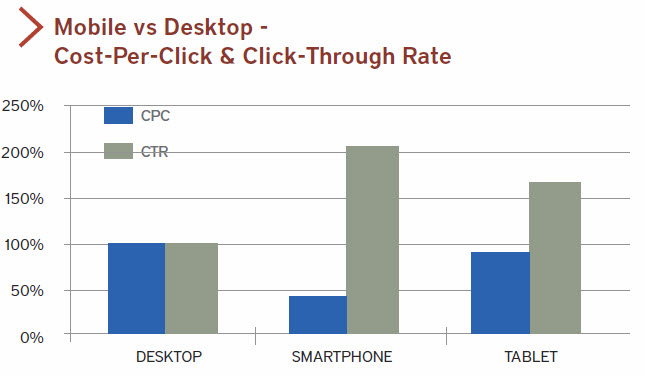
What causes a higher CTR on cell phones & tablets? A smaller search interface, which allows ads to dominate a larger portion of the screen real estate.
Vertical iPhone = 1/3 of an organic listing above the fold.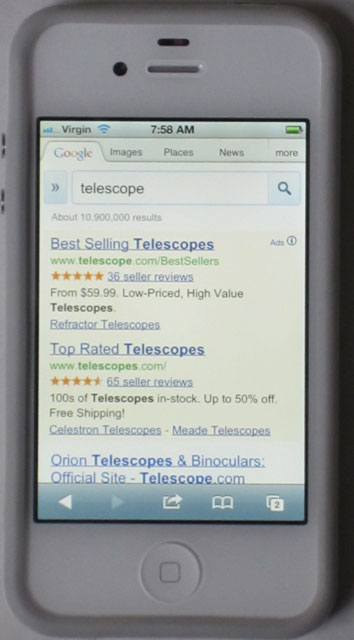
Horizontal iPhone = all ads above the fold.
Vertical iPad is about 2/3 ads above the fold.
Horizontal iPad has about half of a single organic listing above the fold.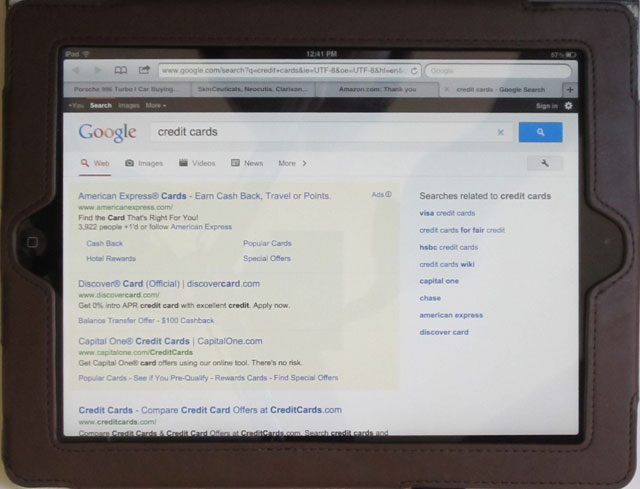
Vertical Kindle is about 2/3 ads.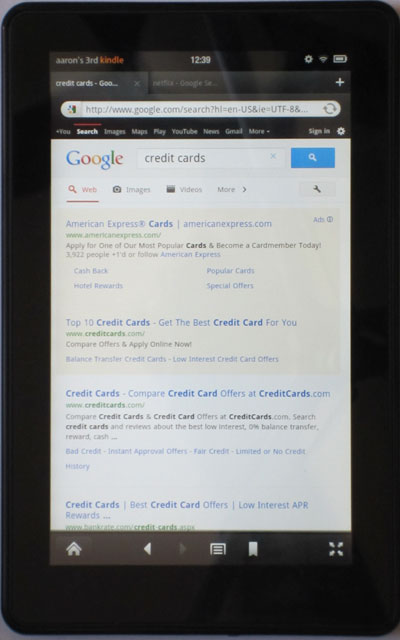
Horizontal Kindle is 100% ads above the fold.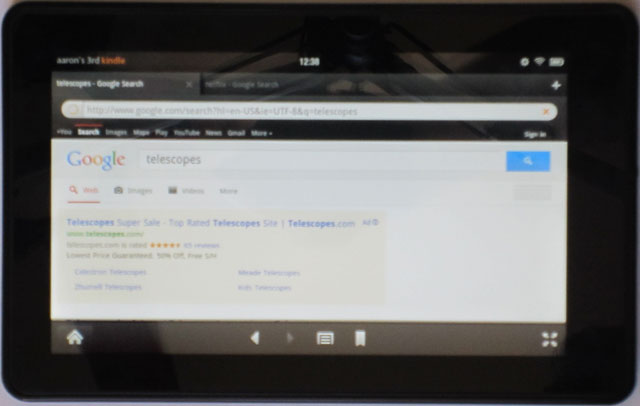
And the above interfaces are not going to look any less ad heavy as Google adds paid inclusion shopping results.
Google offers sitelinks when they think a search query is navigational in nature. In spite of that, for some brands they will still show 3 AdWords ads above the organic search results, in an attempt to force the brand to re-buy their own brand equity.
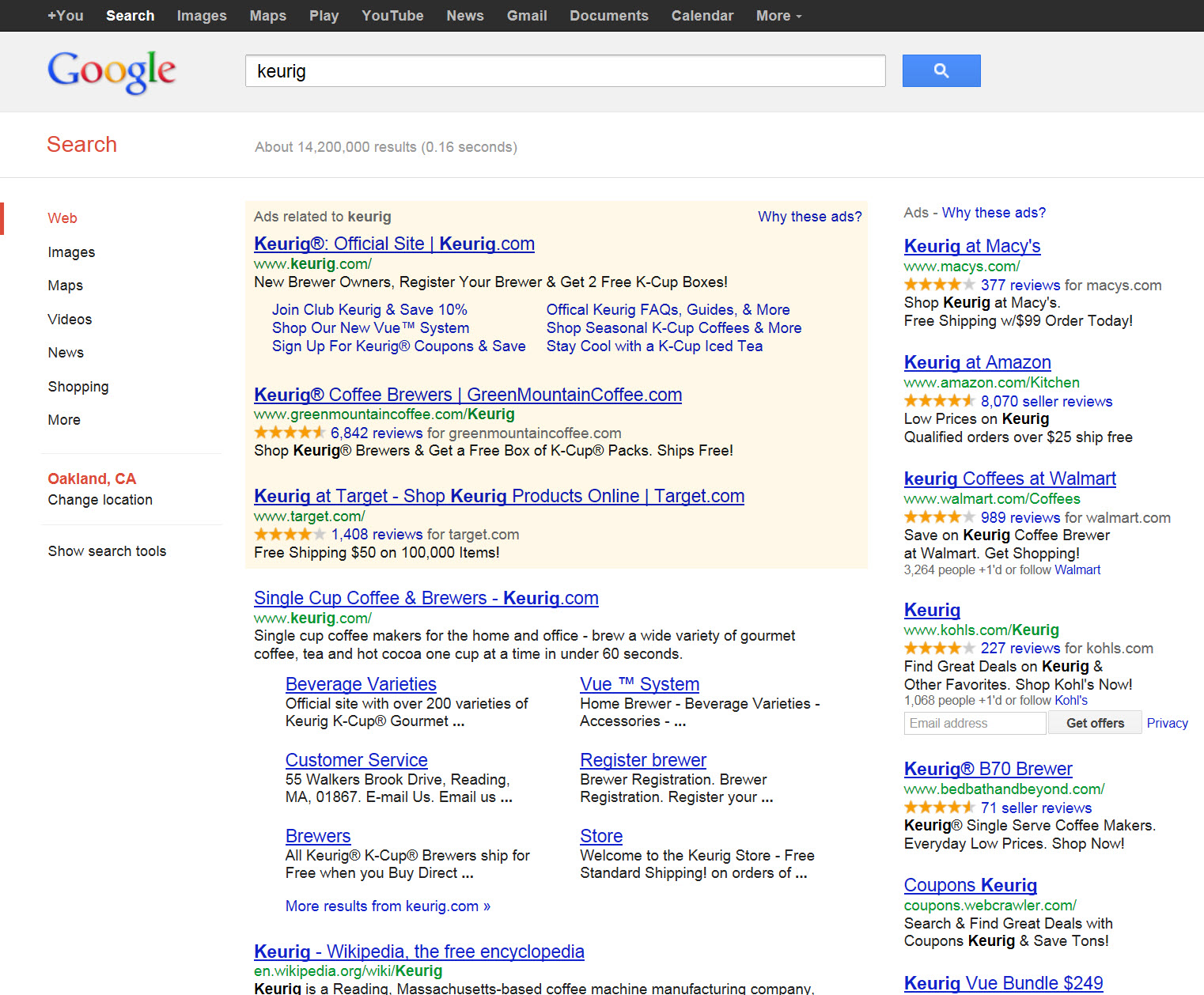
If you control what is above the fold (and can get away with serving nothing but ads above the fold) you can make a lot of money.
Source: http://www.seobook.com/mobile-seo
seo tool land seo leaders online traffic mystic good backlink see book
Source: http://googlebar.mozdev.org/
seo tools seo tool land seo leaders online traffic mystic good backlink
Source: http://www.webuildpages.com/cache/cachetoolpublic.pl
seo leaders online traffic mystic good backlink see book link building
Source: http://www.webuildpages.com/neat-o/
seo leaders online traffic mystic good backlink see book link building
Source: http://www.algotech.dk/googlesearches.asp
seo tools seo tool land seo leaders online traffic mystic good backlink
Source: http://www.thinkbling.com/prcalc/index.php
seo tools seo tool land seo leaders online traffic mystic good backlink
Source: http://www.webconfs.com/similar-page-checker.php
seo tools seo tool land seo leaders online traffic mystic good backlink
Source: http://www.webconfs.com/redirect-check.php
link building use seo seo tools seo tool land seo leaders online
Source: http://www.dnsreport.com/
seo leaders online traffic mystic good backlink see book link building
Source: http://toolbar.msn.com/
seo tools seo tool land seo leaders online traffic mystic good backlink
Source: http://www.xml-sitemaps.com
seo leaders online traffic mystic good backlink see book link building
Source: http://www.googlerankings.com
seo tools seo tool land seo leaders online traffic mystic good backlink
Source: http://www.marketleap.com/siteindex/default.htm
link building use seo seo tools seo tool land seo leaders online
Source: http://www.mcdar.net/KeywordTool/keywordtool.asp
use seo seo tools seo tool land seo leaders online traffic mystic
Source: http://www.trafficmystic.com/239/time-to-get-super-serious-about-lifeless-landing-pages/
use seo seo tools seo tool land seo leaders online traffic mystic
Source: http://www.webconfs.com/website-keyword-suggestions.php
seo tools seo tool land seo leaders online traffic mystic good backlink
Source: http://www.prsearch.net/index.php
seo tool land seo leaders online traffic mystic good backlink see book
Source: http://www.123promotion.co.uk/tools/alexa-related-rank-check.php
seo leaders online traffic mystic good backlink see book link building
Source: http://www.trafficmystic.com/230/niche-blogging-success-secrets-you-can-borrow/
seo leaders online traffic mystic good backlink see book link building
Source: http://www.googlerankings.com
Source: http://www.trafficmystic.com/230/niche-blogging-success-secrets-you-can-borrow/
seo tools seo tool land seo leaders online traffic mystic good backlink
Source: http://www.webconfs.com/url-rewriting-tool.php
seo leaders online traffic mystic good backlink see book link building

Local SEO has the undeserved reputation of being "easy" and "not a lot of work". The competitiveness of keywords might be less competitive than broader keywords but there still is a fair amount of work that goes into getting the campaign off and running properly.
On the whole, keywords targeted in local SEO campaigns are less competitive than their broader counterparts but there are also mitigating factors to consider when determining the overall difficulty of the campaign.
Consideration also needs to be given to how the following factors will effect the overall difficulty of producing a successful campaign:
Some of what I mentioned above doesn't really fall into the "difficulty" of ranking for keywords, but ranking is only a piece of the overall puzzle. You should have an idea of how difficult the entire process will be, because it's more than just rankings at this stage (and has been for awhile).
There are a number of pre-campaign, post-campaign, during-campaign tools you can use for these kinds of campaigns but you don't have to go nuts. Local search stats can be small enough to make extrapolation without PPC or historical analytics data fruitless with respect to actionable date
When you begin to layout your campaign process you could follow a broader roadmap and adjust as necessary. For example, your specifics might change if you are working with an existing site rather than a new one (no historical data, no initial on-site reviews to do, etc).
While links are still and will continue to be uber-important for the foreseeable future, it is wise to consider the rise of site engagement, social signals, and online PR. This is why when we talk about "local SEO" we talk about things like strategic ad buys, social media plays, and PPC for research purposes.
Local SEO can be a lead-in to an entire marketing campaign as we discussed here, so we'll leave ongoing PPC, email marketing, offline ad integration, etc for those kinds of discussions but just know that once you get your foot in the door the door can open pretty wide. The more you can do and the better you do it the better your retention rate will be.
The biggest thing to do is set expectations. If you come running in with unqualified keyword volume reports you are really starting from a level of distrust, even if the client doesn't know it yet. If the client isn't interested in some initial PPC then it's in your best interest to clue them in on the potential inaccuracy of various keyword tools.
For an existing site you can pull keyword search data from whatever analytics package the client has as well as from both sets of webmaster tools (Bing and Google). You can cross reference that with current rankings to see where you might be able to score some quick wins.
For a new site, set up accounts on Google's Webmaster Tools as well as Bing's. These will come in handy down the road for more keyword data, link data, and site health reviews.
We've talked about local SEO keyword research via PPC before and on top of that, or in lieu of that if the client isn't interested, you can get some local and a bunch of broader keywords from tools like:
In addition to keyword research tools, you can you a couple of free tools to help generate and populate local keywords:
The second tool combines search terms with local modifiers in a given radius of the area you select.
If you find local volume lacking I suggest the following steps:
Quite a few local sites are going to be your brochure-style sites. Site structure can vary quite a bit depending on the size and scope of the site. Since most local sites focus on a particular product or service (rather than being Amazon.Com) it is wise to keep the following in mind:
Tools like Google's Page Speed and Yslow can provide you with detailed analysis on potential site loading issues prior to launch. I have found that printing these out before/after is a good way to show the client, who typically is a novice, some of the stuff that is going on behind the scense. Clients like before and afters (when the after is more favorable than the before of course).
Tracking is key, naturally, so you'll need to pick an analytics package. There are some decent Google Analytics alternatives, if you aren't interested in dealing with the borg. That said, you can choose from some fairly full-featured packages
For ease of use and feature sets I tend to either go with Clicky, Mint or Google Analytics. I haven't spent much time with Woopra and I find Piwik to not be as intiuitive or as user friendly as the other 3 I mentioned (which is even more important when the client wants/needs access.)
Speaking of tracking, you should consider getting familiar with a cheap virtual phone number vendor (I would recommend phone.com) as well as Google's URL builder for tracking potential adverts and media buys down the road (as well as offline adverts if you end up servicing that aspect of the client's marketing campaign). If you use Google Analytics, another cool tool to use is Raven's Google Analytics configuration tool
I generally recommend staying away from tracking numbers because it can screw up your Google Places rankings and trust but when I use them I typically just make them images on whatever page they are being listed on and I never use them for IYP citations (listings on sites like Yelp, Yellowpages, Merchant Circle, etc).
For local sites, you'll want to attack link building on two fronts: 1. External links 2. Citations.
Before you get into any of the link planning, you should get the client set up in KnowEm. KnowEm will help get the client on all the relevant social networks and goes a long way in establishing the base for the client to control it's branded searches and branded SERPs.
You can choose from a variety of packages from basic registration to complete profile set up (bio's, pictures, descriptions, etc). Once these profiles are built, you can begin building links to them (and link to them from the client's site) to further the client's domination of their own branded SERPs.
For citations, I would recommend using Whitespark (we reviewed it here). Whitespark really is an essential tool in building citations, tracking citations, and doing competitive citation research. Speaking of citations, each year David Mihm releases the Local Search Ranking Factors and I would highly recommend saving each year's version and refer back to it when designing your citation building plan(s).
As for traditional link building, it's fairly similar to non-local link building with respect to the broader overview of link outreach but can be niched down to focus on locality for both link equity and qualified traffic.
Some of the things you can do at the beginning of the link planning process would be:
Infographic ideas for local clients, depending on the niche, can be found fairly easily and can bring in lots and lots of local links and exposure. Every state and many towns/cities have Wikipedia pages which link out to demographic statistics. There is a trove of data available and if you can be creative with the data + your client's niche there are lots of opportunities for you.
For instance, in Rhode Island insurance rates are typically higher than neighboring states (Massachusetts, New Hampshire, Vermont, etc). The reasons generally are things like exposure to coastal regions, proximity of towns to city center, accident history, etc. You could easily make a decent infographic about this. Local news and resource sites would probably be willing to gobble it up. If you were able to interview insurance company spokespeople you could find yourself with some pretty good exposure and some pretty solid links.
The reality is that if you do not properly set expectations (maybe think about showing the client how the sausage is made pre-campaign) and you take whatever budget comes your way you will not be able to provide quality service for very long, the campaign will not succeed, and you may do irreparable harm to your brand in your local market.
If you have other results and testimonials to fall back on, as well as a solid plan mapped out (that can be explained to the client), then you've held up your end of the bargain with respect to providing a fair proposal for your time and effort. Sometimes the initial planning is the most time-intensive part of a local campaign.
Plan it out correctly from the beginning and you should be able to produce the results required to keep the client and build up your brand in your local market.
Source: http://www.seobook.com/laying-groundwork-local-seo-campaign
use seo seo tools seo tool land seo leaders online traffic mystic
Source: http://www.yahoosearchrankings.com/
link building use seo seo tools seo tool land seo leaders online
Source: http://www.seochat.com/seo-tools/pagerank-search/
seo tools seo tool land seo leaders online traffic mystic good backlink
Source: http://www.seobench.com/multi-dc-pr-check/
use seo seo tools seo tool land seo leaders online traffic mystic
Source: http://www.trafficmystic.com/249/ways-to-inject-power-into-your-articles-methods-that-really-work/
seo tools seo tool land seo leaders online traffic mystic good backlink
The rapid changes in the search industry over the last sixteen months have left many web publishers wondering whether they should pivot their business models or exist the industry entirely. This is a difficult question for business owners who have invested years of their lives and much of their wealth in firms which may no longer be viable contenders in the "new" search industry.
SWOT analysis is a technique which business owners can use to strategically analyze their businesses in relation to their competitors and the marketplace as a whole. SWOT stands for Strengths, Weaknesses, Opportunites, Threats.

The first two areas, Strengths and Weaknesses, focus primarily on the internal attributes of the organization. The last two areas, Opportunities and Threats, focus primary on how the organization may be affected by external events.
Many firms in the same industry will share similar Strengths and Weaknesses. Even more so, most firms in any industry will be responding to similar Opportunities and Threats.
Take a look at your organization. If you feel that your organization has an attribute which makes it stronger than it's competitors, add that to your Strengths list. If you feel that your organization has an attribute that makes it weaker than it's competiors, add that item to your Weaknesses list. 
Examples of Strengths might include:
Examples of Weaknesses might include:
The same event might be an Opportunity or a Threat, depending upon how your organization can respond to it. Search is a zero-sum game. For every winner, there must be a loser.
Take a look at your organization. If you feel that your organization has the ability to benefit from a coming change in the business environment, add that to your Opportunities list. If you believe that your organization is at risk from a coming change, add that to your Threats list.
Examples of Opportunities might include:
Examples of Threats might include:
 After listing your Strengths, Weaknesses, Opportunities, and Threats you should have a pretty good idea where your business stands. From here, it's time to take advantage of this new knowledge.
After listing your Strengths, Weaknesses, Opportunities, and Threats you should have a pretty good idea where your business stands. From here, it's time to take advantage of this new knowledge.
The web publishing industry is currently undergoing a major contraction. Some organizations will choose to continue in this business, while others will choose to pivot into related business or to exit the industry entirely. AdSense publishers may decide to move into affiliate marketing or selling white label products. Web publishers may decide to halt development on their own projects and offer their services as SEO's to large enterprises. Entrepreneurs may simply close their companies and accept positions with larger firms.
If your niche is travel, which Google is slowly taking over and Wikimedia is considering a push into, you might consider moving to a different niche, pivoting your web publishing business into an SEO firm, or moving into the nascent eBook market. If your niche is 3D printers, you might seek funding to stake out early market share in a niche that may be about to cross the chasm from the early adopter stage of development.
If you have deep knowledge, experience, and connections in your niche, you might try to stick with it and be the last man standing after your weaker competitors have failed. If your knowledge is less niche focused and more related to publishing and marketing, you might sell SEO services or take a job with one of the huge multinational brands which Google is currently favoring in the SERPs.
If you have access to large amount of venture capital, you might take advantage of that to become one of the large brands which Google prefers to rank. With enough funding, anything can be ranked well in Google. I would caution, however, against entering a niche which is likely to be on Google's roadmap. Google, in being able to control the order of search results, has an unbeatable advantage in promoting their own properties (YouTube, Google+, etc...).
As margins in the industry are falling in our race to the bottom, you may even find a significant competitive advantage in having a lower cost structure than your competitors. Lower costs create larger amounts of retained earnings which can be used to fuel development and growth.
The two most important aspects of SWOT analysis are to be honest with yourself and to take action based upon your analysis. As Virgil wrote, fortune favors the bold. Be bold in your honesty and your actions and fortune will smile upon you.
Will Spencer is the CEO of MemeBridge and Alpha Geek at The Tech FAQ.
Source: http://www.seobook.com/swot-analysis-web-publishers
seo leaders online traffic mystic good backlink see book link building

My good friend Bill at SEOByTheSea has unearthed a Google patent that will likely raise eyebrows, whilst others will have their suspicions confirmed.
The patent is called Ranking Documents. When webmasters alter a page, or links to a page, the system may not respond immediately to those changes. Rather, the system may change rankings in unexpected ways.
A system determines a first rank associated with a document and determines a second rank associated with the document, where the second rank is different from the first rank. The system also changes, during a transition period that occurs during a transition from the first rank to the second rank, a transition rank associated with the document based on a rank transition function that varies the transition rank over time without any change in ranking factors associated with the document.
Further:
During the transition from the old rank to the target rank, the transition rank might cause:
- a time-based delay response,
- a negative response
- a random response, and/or
- an unexpected response
So, Google may shift the rankings of your site, in what appears to be a random manner, before Google settles on a target rank.
Let's say that you're building links to a site, and the site moves up in the rankings. You would assume that the link building has had a positive effect. Not so if the patent code is active, as your site may have already been flagged.
Google then toys with you for a while before sending your site plummeting to the target rank. This makes it harder to determine cause and effect.
Just because a patent exists doesn't mean Google is using it, of course. This may be just be another weapon in the war-of-FUD, but it sounds plausible and it?s something to keep in mind, especially if you're seeing this type of movement.
In ancient times (1990s), SEO thrived because search engines were stupid black boxes. If you added some keywords here, added a few links there, the black box would respond in a somewhat predictable, prescribed, fashion. Your rankings would rise if you guessed what the black box liked to "see", and you plummeted if you did too much of what the black box liked to see!
Ah, the good old days.
These days, the black box isn?t quite so stupid. It?s certainly a lot more cryptic. What hasn?t changed, however, is the battle line drawn between webmasters and search engines as they compete for search visitor attention.
If there are any webmasters still under the illusion that Google is the SEOs friend, that must be a very small club, indeed. Google used to maintain a - somewhat unconvincing - line that if you just followed their ambiguous guidelines (read: behaved yourself) then they would reward you. It was you and Google on the good side, and the evil spammers on the other.
Of late, Google appear to have gotten bored of maintaining any pretense, and the battle lines have been informally redrawn. If you?re a webmaster doing anything at all that might be considered an effort to improve rank, then you're a "spammer". Google would no doubt argue this has always been the case, even if you had to read between the lines to grasp it. And they?d be right.
Unconvinced?
Look at the language on the patent:
The systems and methods may also observe spammers? reactions to rank changes caused by the rank transition function to identify documents that are actively being manipulated. This assists in the identification of rank-modifying spammers.
?Manipulated?? ?Rank modifying spammers?? So, a spammer is someone who attempts to modify their rank?
I?ve yet to meet a webmaster who didn?t wish to modify their rank.
Google?s business model relies on people clicking ads. In their initial IPO filing, Google identified rank manipulation as a business risk.
We are susceptible to index spammers who could harm the integrity of our web search results. There is an ongoing and increasing effort by ?index spammers? to develop ways to manipulate our web search results
It?s a business risk partly because the result sets need to be relevant for people to return to Google. The largely unspoken point is Google wants webmasters to pay to run advertising, not get it for ?free?, or hand their search advertising budget to an SEO shop.
Why would Google make life easy for competitors?
The counter argument has been that webmasters provide free content, which the search engines need in order to attract visitors in the first place. However, now relevant content is plentiful, that argument has been weakened. Essentially, if you don't want to be in Google, then block Google. They won't lose any sleep over it.
What has happened, however, is that the incentive to produce quality content, with search engines in mind, has been significantly reduced. If content can be scraped, ripped-off, demoted and merely used as a means to distract the search engine user enough to maybe click a few search engine ads, then where is the money going to come from to produce quality content? Google may be able to find relevant content, but "relevant" (on-topic) and "quality" (worth consuming) are seldom the same thing
One content model that works in such as environment is content that is cheap to produce. Cheap content can be quality content, but like all things in life, quality tends to come with a higher price tag. Another model that works is loss-leader content, but then the really good stuff is still hidden from view, and it's still hard to do this well, unless you've established considerable credibility - which is still expensive to do.
This is the same argument the newspaper publishers have been making. The advertising doesn?t pay enough to cover the cost of production and make a profit - so naturally the winner in this game cuts production cost until the numbers do add up. What tends to be sacrificed in this process - is quality.
NFSW Corp, a new startup by ex-TechCrunch and Guardian columnist writer Paul Carr has taken the next step. They have put everything behind a paywall. There is no free content. No loss-leaders. All you see is a login screen.
Is this the future for web publishing? If so, the most valuable content will not be in Google. And if more and more valuable content lies beyond Google's reach, then will fewer people bother going to Google in the first place?
Google argue that they focus on the user. They run experiments to determine search quality, quality as determined by users.
Here?s how it works. Our engineers come up with some insight or technique and implement a change to the search ranking algorithm . They hope this will improve search results, but at this point it?s just a hypothesis. So how do we know if it?s a good change? First we have a panel of real users spread around the world try out the change, comparing it side by side against our unchanged algorithm. This is a blind test ? they don?t know which is which. They rate the results, and from that we get a rough sense of whether the change is better than the original. If it isn?t, we go back to the drawing board. But if it looks good, we might next take it into our usability lab ? a physical room where we can invite people in to try it out in person and give us more detailed feedback. Or we might run it live for a small percentage of actual Google users, and see whether the change is improving things for them. If all those experiments have positive results, we eventually roll out the change for everyone"
Customer focus is, of course, admirable, but you?ve got to wonder about a metric that doesn?t involve the needs of publishers. If publishing on the web is not financially worthwhile, then, over time, the serps will surely degrade in terms of quality as a whole, and users will likely go elsewhere.
There is evidence this is already happening. Brett at Webmasterworld pointed out that there is a growing trend amongst consumers to skip Google altogether and just head for the Amazon, and other sites, directly. Amazon queries are up 73 percent in the last year.
There may well be a lot of very clever people at Google, but they do not appear to be clever enough to come up with a model that encourages webmasters to compete with each other in terms of information quality.
If Google doesn?t want the highest quality information increasingly locked up behind paywalls, then it needs to think of a way to nurture and incentivise the production of quality content, not just relevant content. Tell publishers exactly what content Google wants to see rank well and tell them how to achieve it. There should be enough money left on the table for publishers i.e. less competition from ads - so that everyone can win.
I?m not going to hold my breath for this publisher nirvana, however. I suspect Google's current model just needs content to be "good enough."